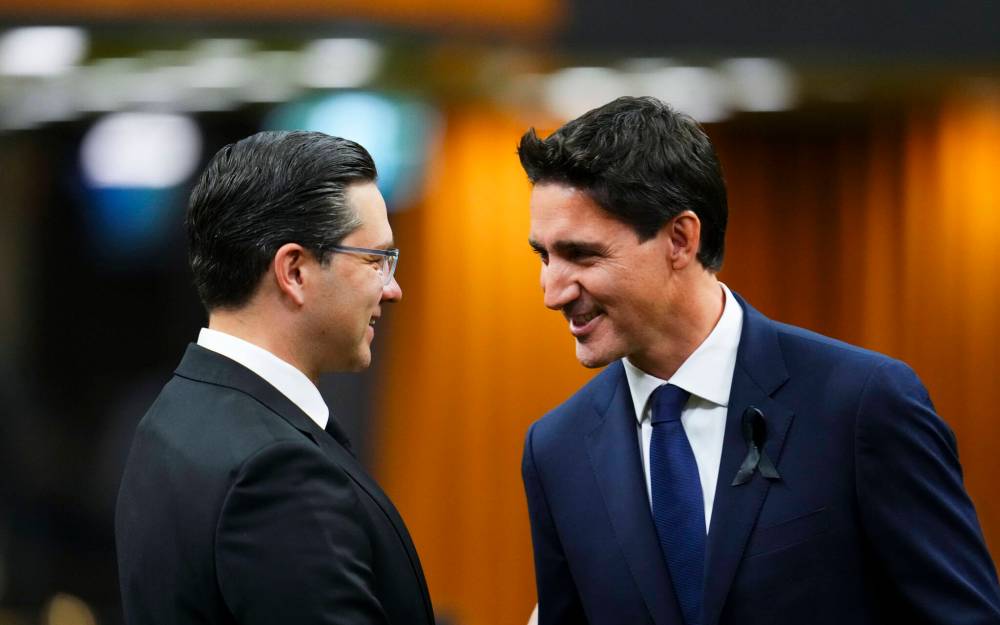
“His answer to everything is cuts and be angry, that’s not Canada.” Prime Minister Justin Trudeau on July 31, 2023 in Hamilton, Ont.
The prime minister was in campaign mode this week in Hamilton, attacking his key opponent, Pierre Poilievre, the leader of the Conservatives.
Let’s stipulate right from the beginning that in the summer of 2023, we are definitely not in the throes of a national election campaign. There is a provincial campaign underway in Manitoba, although the August heat chases away any highly visible electioneering.
THE CANADIAN PRESS/Sean Kilpatrick/File Prime Minister Justin Trudeau and Conservative leader Pierre Poilievre each trying to find the message that resonates with the most voters.
And that will continue to the case until after the Labour Day weekend.
But on the federal side of life, PM Justin Trudeau is large and in charge of when he calls a general election. He’s technically captaining a minority ship — but due to the deal struck more than a year ago with the NDP, as long as Jagmeet Singh’s caucus continues to vote in the House of Commons with the Liberals, Trudeau has the a de facto majority government in Ottawa.
Since the last go was two years ago, we don’t have to have another for two more years.
So why is the PM sounding and looking like a campaigner? Political scientists will tell you that in the real world, every day is a campaign day.
Every day in political life, you are moving up or down in the opinion of the public. In these dog days of summer, all the polls are telling us the Liberals have been losing ground. Some think that, if two years from now polling stays at the current levels, the Conservatives might even find themselves with within 10 to 20 seats of a majority.
If Conservatives end up with even a handful of seats more than the Liberals, I think Poilievre will cut the cards with the Bloc Quebecois and govern much the way the Liberals doing are right now, propped up by the NDP.
The BQ has contempt for all the federal parties, indeed for federalism itself. So they would be wide open to a deal with the Poilievre Conservatives that would give the Bloc something they could tell their constituents is a good deal for Quebec nationalists.
When Canada’s prime minister appears to be campaigning, he’s testing his audiences. And he’s testing his material. He wants to know which messages are generating a good vibe for Liberals.
This week’s message was that the Opposition leader is too angry, too often, and in a mood to chop government programs. The question for any thinking Canadian is this: who is speaking for the 40 per cent of Canadians?
I ask the question that way because I’m tired of pretending that any of the leaders are focused on speaking for the overwhelming majority of Canadians. They never are. But they know the math that keeps them in business.
Their survival depends on knowing how to cultivate close to 40 per cent of the population. That’s what is generally needed to form government. So we need to ask ourselves this question. Are 40 per cent of Canadians generally angry with the direction of the country? And are they in the mood for cuts in government spending? My political GPS says yes.
That’s based on what I observe and the feedback I receive from Canadians every single day. They are in a mood. And it’s not a good one.
Many feel the government is spending too much and that always means they are thinking the government is spending too much on other people. Very few citizens say no to the idea of the government spending money on them or giving money back to them. And that’s why in Manitoba, no matter what pundits may moralize about, the public is not angry about cashing refunds the provincial government is sending them.
No Manitoban with property is asking for a tax increase. No Manitoban seeking child care is saying no to a cut in those expenses.
When people across Canada form a quiet consensus that too much money is being spent by the federal government and too much debt is being created because of support that is going to people other than themselves, you end up with a situation where the public tends to agree with the angry opposition more often than it agrees with the status quo being defended by the government.
The next time the prime minister wants to tell people that the Conservative leader is always pushing the anger button, he might want to check to see if Canadians are also uncomfortably angry in the summer of 2023.
Charles Adler is a longtime political commenter and podcaster. [email protected]



